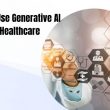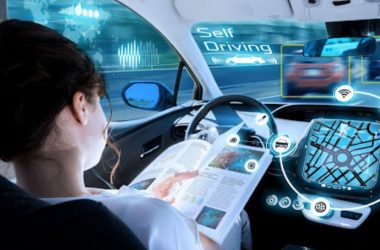Executive Summary:
AI Powered chatbots are improving patient interactions and support, changing the face of healthcare. Healthcare now offers individualized help and eventually improves patient experiences due to generative chatbots in healthcare.
Introduction:
Technology has continuously pushed the envelope to provide improved patient care in the constantly changing healthcare field. Generative AI chatbots, one of the most recent technical advancements, are redefining how we interact with healthcare systems.
These complex programs are revolutionizing patient relationships using artificial intelligence (AI) to provide individualized and effective support.
The Role of Generative Chatbots in Healthcare
Generative AI chatbots have a far larger role in healthcare than simple automation. These sophisticated AI-driven conversational agents have the power to fundamentally transform the healthcare industry in several important areas, including:
1) Personalized Medical Aid
Generative chatbots can provide extremely personalized medical aid. They can examine specific patient information, such as medical histories, present symptoms, and treatment plans.
As a result, they can offer recommendations and counseling specifically customized to each patient’s needs. This personalization improves patients’ quality of care, which guarantees that they receive correct and pertinent guidance.
- Patient Data Analysis:
AI Powered chatbots can swiftly and effectively analyze enormous volumes of patient data. Electronic health records, a person’s medical past, lab findings, and even real-time information like symptoms and vital signs can all be included in this data.
By digesting this data, chatbots can build a detailed profile of a patient’s health, problems, and treatment history.
- Treatment Suggestions:
Generative AI chatbots can provide highly individualized treatment suggestions if they are thoroughly aware of a patient’s medical history.
They can recommend the best treatment alternatives based on allergies, drug interactions, and personal preferences. For instance, a chatbot could suggest particular drugs, treatments, or lifestyle modifications based on the patient’s needs.
2) Constant Availability
One of the major benefits of generative chatbots is their constant accessibility. Patients no longer have to wait for traditional office hours or sift through reams of online information; instead, they may obtain information and help whenever needed.
When people have urgent medical needs or are in an emergency, having access to help right away can be extremely important.
- Immediate Access to Information:
Healthcare concerns don’t follow conventional business hours. Whether it is early in the morning, late at night, or on weekends and holidays, patients may feel symptoms, have questions, or need support at any time.
Since generative chatbots are built to be constantly available, patients can get instant access to accurate and trustworthy information whenever needed.
- Reducing Wait Times:
Traditional healthcare facilities sometimes require appointment waiting hours, whether in a doctor’s office, urgent care facility, or emergency department.
These wait durations can aggravate and even harm a patient’s health in some circumstances. This problem is resolved by generative chatbots offering quick solutions to inquiries.
3) Responding to Medical Queries
Patients frequently have inquiries concerning their health, medications, and treatment regimens. Generative chatbots can effectively answer these questions, which provide precise and recent information.
In addition to empowering individuals to take charge of their health, this lightens the load on healthcare professionals and frees them up to concentrate on more arduous duties.
- Information Accessibility:
The healthcare industry is complicated, and there is much jargon and medical facts to learn. Questions concerning one’s health, illnesses, therapies, drugs, and symptoms are common among patients. The purpose of generative chatbots is to serve as instantaneous access points for medical knowledge.
They can explain concepts in simple, intelligible terms, ensuring patients can access and understand crucial medical information.
- Symptom Assessment:
Patients can describe their symptoms to chatbots, offering basic information about possible reasons or suggesting whether they should seek emergency medical assistance.
Chatbots can offer useful introductory data but cannot substitute for a clinical diagnosis.
4) Emotional Support
Receiving medical care can make a lot of people anxious and stressed out. Empathetic conversational skills are a feature of generative chatbots, which can offer emotional support and a listening ear.
They may converse with patients while providing comfort and assurance, which can greatly enhance the general patient experience.
- Empathetic Discussions:
Generative chatbots may engage in discussions that express compassion and understanding since they were designed with empathetic language models. These chatbots can identify emotional indicators in text input and provide appropriate empathy in their responses.
For instance, the chatbot can provide consolation and confidence to a patient who is worried or concerned about undergoing a medical operation.
- Active listening:
Compassionate assistance The art of active listening, which is paying close attention to what patients are saying and responding in a way that demonstrates proper understanding, is a talent that chatbots are adept at.
They can provide a safe environment for patients to express themselves by acknowledging and validating their feelings.
5) Data Gathering and Analysis
Generative AI chatbots are extremely important for data gathering and analysis. They can collect crucial patient data, such as symptoms, vital signs, and patient-reported outcomes, and easily incorporate it into electronic health records.
By streamlining the documentation process, healthcare professionals are given a thorough and current picture of the patient’s health status, in addition to streamlining the recording process itself.
This aggregated data is further used by population health management and research, both progressing healthcare.
- Increased Data Accuracy:
Information entered by patients themselves occasionally contains mistakes or discrepancies. With the help of generative chatbots, patients can be asked particular questions and have their answers verified, which lowers the risk of errors.
This guarantees that the information needed to make decisions is trustworthy and high-quality for healthcare practitioners.
- Remote Monitoring:
Remote monitoring of vital signs and symptoms is crucial for individuals recovering from surgery or those with chronic diseases.
Chatbots can remotely gather this information, enabling medical professionals to monitor a patient’s development and take appropriate action. This preemptive approach can avoid complications and lower readmissions to hospitals.
Conclusion:
Specifically created for the healthcare industry, AI Powered chatbots development services are ushering in a new era of patient connection.
These chatbots increase patient experiences and enhance healthcare outcomes by offering personalized assistance, round-the-clock accessibility, answers to medical questions, emotional support, and data-driven insights.
We can anticipate even more cutting-edge uses of generative chatbots in healthcare as AI advances, eventually benefiting patients and healthcare providers.










